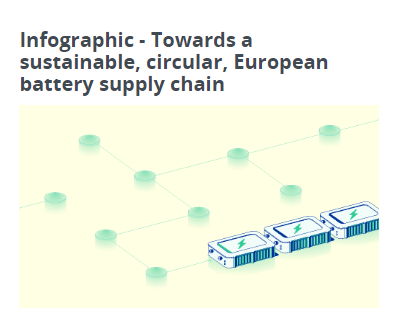10/07/2023
The Council of Europe Adopts New Regulation on Batteries and Waste Batteries

On Monday, 10 July 2023, the Council of the European Union adopted a new regulation that strengthens sustainability rules for batteries and waste batteries. This regulation covers the entire life cycle of batteries, ensuring their safety, sustainability and competitiveness from production to reuse and recycling.
Read the official press release
Recognising the vital role batteries play in the decarbonisation process and the transition towards zero-emission mobility, Teresa Ribera, Spanish Minister for the Ecological Transition reinforced the Presidency’s support for the regulation, which applies to all types of batteries: waste portable batteries, electric vehicle batteries, industrial batteries, starting, lightning and ignition (SLI) batteries primarily used in vehicles and machinery, as well as batteries for light means of transport like electric bikes, e-mopeds, and e-scooters.
“At the same time end-of-life batteries contain many valuable resources and we must be able to reuse those critical raw materials instead of relying on third countries for supplies. The new rules will promote the competitiveness of European industry and ensure new batteries are sustainable and contribute to the green transition.”
| Teresa Ribera, Spanish Minister for the Ecological Transition
To foster a circular economy, the regulation establishes requirements for the end-of-life phase, including collection targets and obligations, material recovery targets, and extended producer responsibility. Dedicated collection objectives for waste batteries used in light means of transport will be implemented, aiming at 51% by the end of 2028, respectively 61% by the end of 2031. Furthermore, the regulation sets mandatory minimum levels of recycled content for industrial batteries, SLI batteries and electric vehicle batteries. The following initial values have been established:
- 16% for cobalt
- 85% for lead
- 6% for lithium
- 6% for nickel
Additionally, batteries will also be required to hold documentation proving their recycled content.
To improve the functioning of the internal market for batteries and ensure fair competition, the regulation introduces safety, sustainability, and labelling requirements. It includes provisions for battery labelling and information disclosure, including details on battery components and recycled content. Additionally, an electronic “battery passport” and a QR code will be implemented to enhance traceability and transparency. These labelling requirements will take effect by 2026, while the QR code implementation is expected by 2027, providing member states and manufacturers with ample time to prepare.
This new regulation aims to mitigate environmental and social impacts throughout the battery’s life cycle. By establishing strict due diligence rules for operators, the EU is ensuring operators are bound to verify the source of raw materials used for batteries placed on the market. However, the regulation provides for an exemption for SMEs from the due diligence rules.
The adoption procedure for the regulation concluded with the Council’s vote, and it will now proceed to be signed by both the Council and the European Parliament. Following this, the regulation will be published in the European Union’s Official Journal and will enter into force 20 days thereafter.
Monitoring Crucial Secondary Legislation Linked to the Batteries Regulation
The new regulation aiming at strengthening sustainability rules for batteries and waste batteries will be supported by various secondary legislation pieces that play a crucial role in ensuring the comprehensive and effective implementation of the proposal’s objectives, particularly in important areas such as raw material sourcing, battery design, manufacturing processes, the second-life of a battery, and battery recycling and reuse.
One of the most urgent legislations is the carbon footprint (Art. 7) methodology for electric vehicles (EVs), which is under development with the JRC report and is expected by early 2024. Another relevant piece of secondary legislation is referring to recycling efficiencies (Art. 71), where the JRC is closely working with stakeholders in different expert groups.
The Cluster Hub “Production of raw materials for batteries from European resources” within the current legislative framework
As the implementation of the new battery regulation progresses, the Cluster Hub will continue to serve as a catalyst for advancements in battery recycling. By leveraging the collective efforts and expertise of participating projects, the platform acknowledges its pivotal role in driving the transition towards a more sustainable and circular future for the battery industry in Europe.
Get to know the EU-funded projects driving the innovations for the recycling of batteries: CROCODILE, RHINOCEROS, BATRAW, FREE4LIB, RESPECT, RELiEF and LiCORNE.
 SHARE ON
SHARE ON
 Website managed by PNO Innovation
Website managed by PNO Innovation